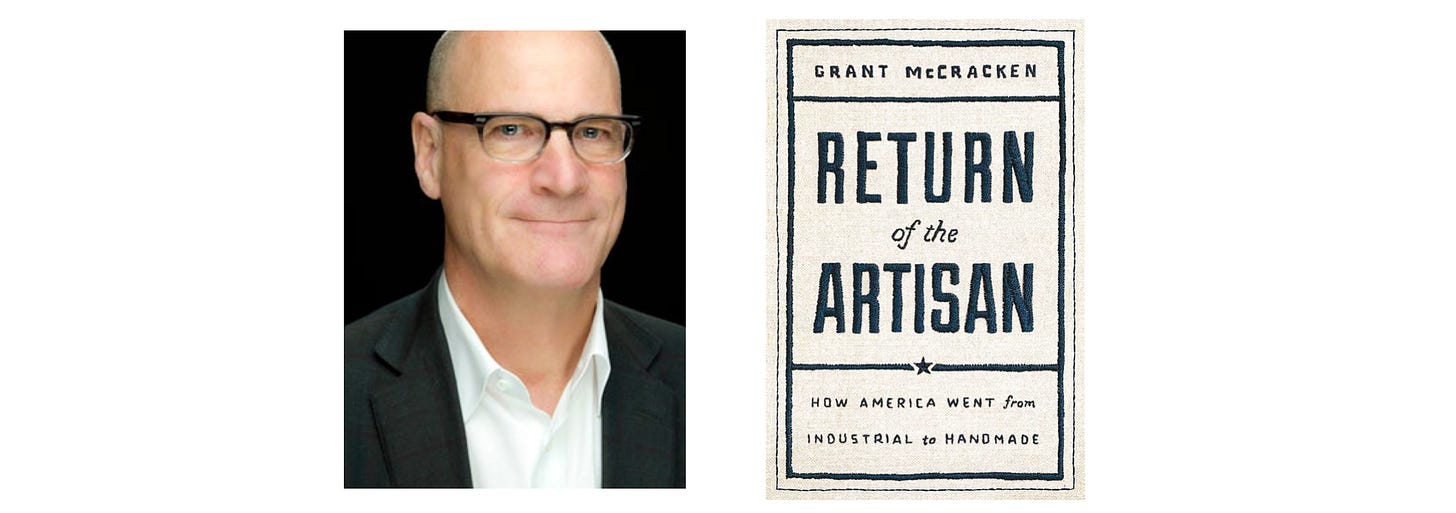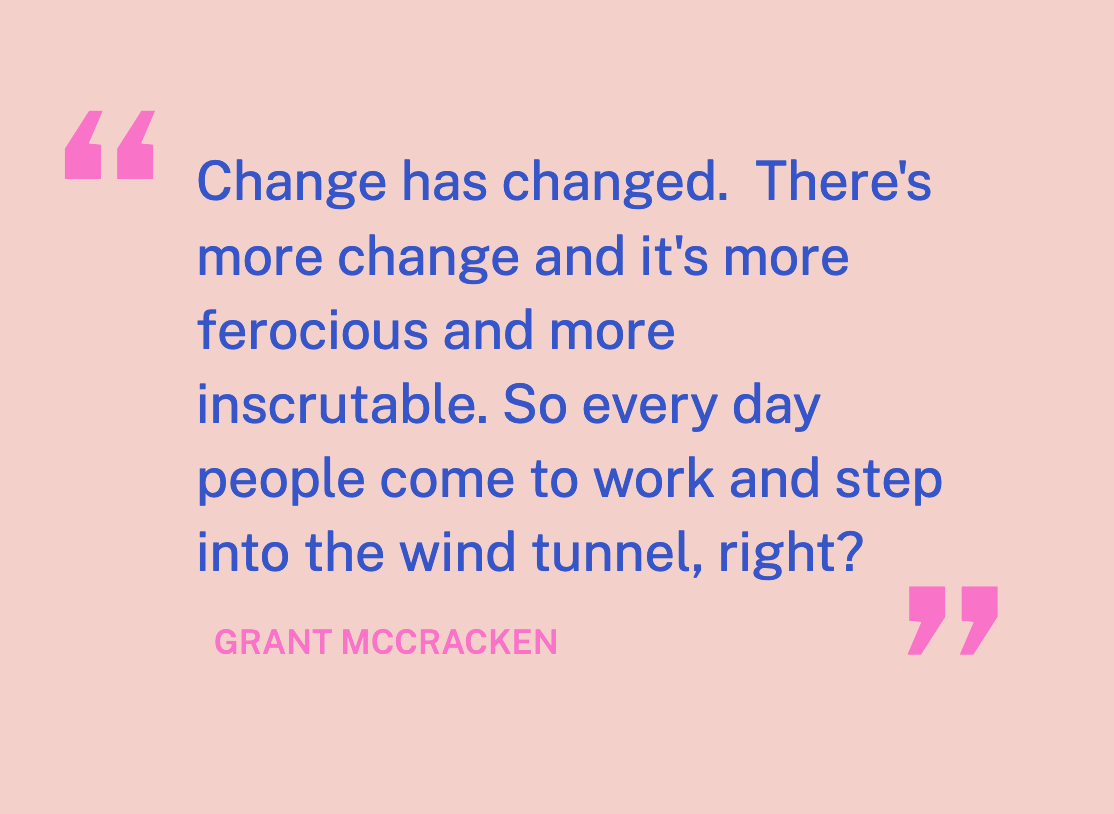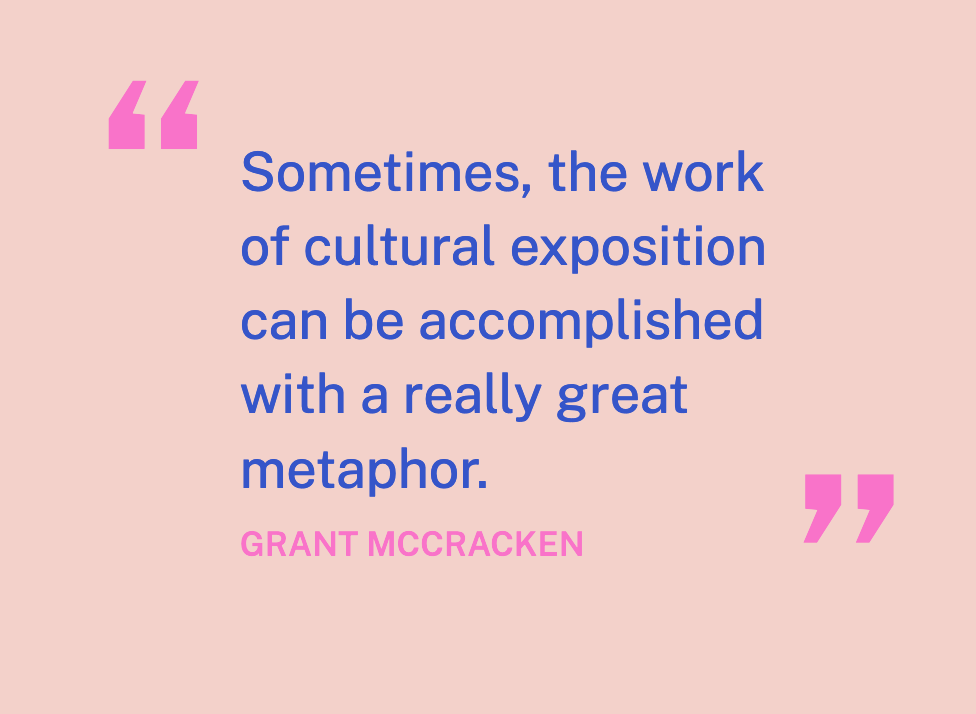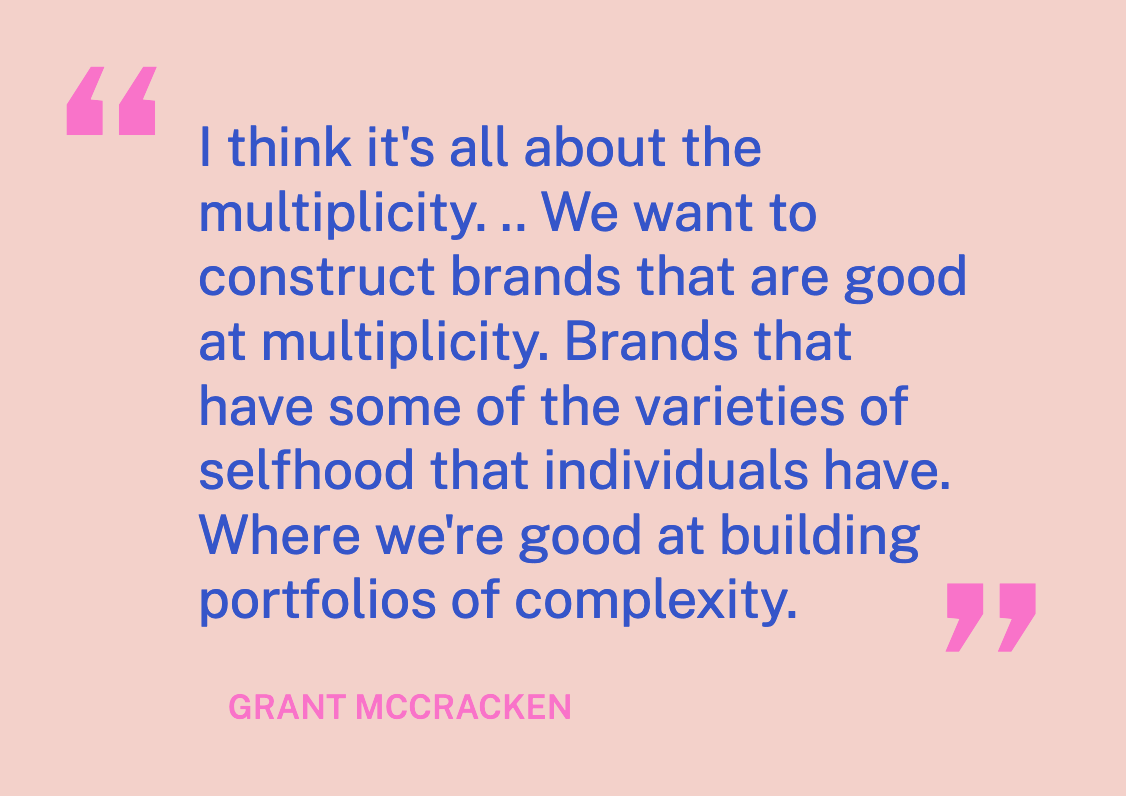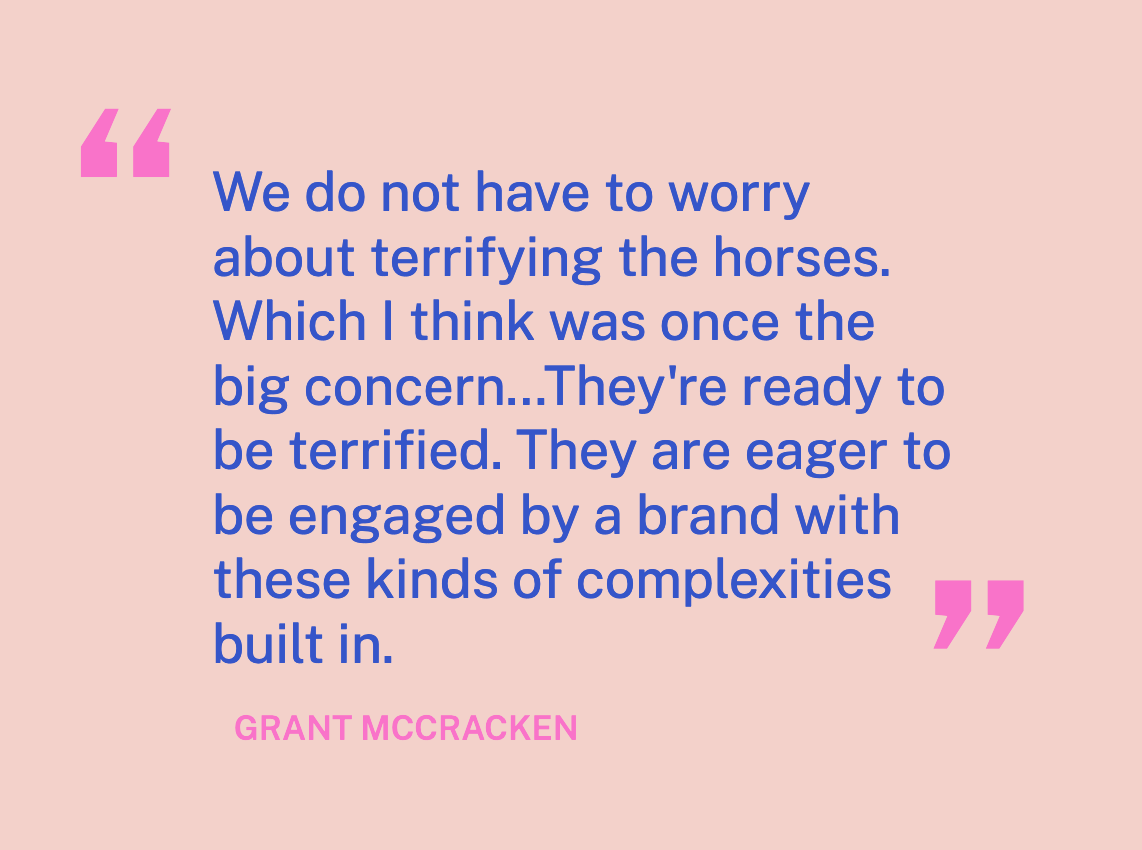Grant McCracken is the first anthropologist I encountered. No one had ever talked about the world I grew up in the way he did. I was a fan from the start, and followed him ever since. I even got to host him here in Hudson, New York as part of his research into artisanal economies. (My appearance in the book is a career highlight.)
When I thought to do interviews, he was the first person to come to mind.
Everything he does is worth paying attention to, but please check out The Gravity Well Effect and The Return of the Artisan: How America Went from Industrial to Handmade.
Stay tuned for his FUTURE CAMP in NYC in March.
Peter Spear: I start all interviews with the same question. Where do you come from?
Grant McCracken: What a great question. No, it's so complicated. I live, I'm a simple man who lives a simple life, but it's still a very complicated question. I guess I come mostly from anthropology. I guess that just really shaped me. I think we share a curiosity about the world. And for me, anthropology ended up giving me a way to give that a kind of form and momentum. Anthropology would be my answer. Yeah.
Do you have a recollection of when you first encountered anthropology? Or discovered it was possible?
What comes to mind when you say that is I went to the University of Chicago, all the first year students went in to listen to Marshall Sahlins give the first lecture of their first year. And as we walked towards the lecture hall, somebody raised the question of whether we were going to buy the books for the course. And, everyone made this show of how casual they were, and maybe they'd buy a few books and was it necessary would we read everything? Maybe we wouldn't.
Then we all sat and listened to Sahlin's talk for an hour or so. And you could see people coming out of the lecture hall. It was clear they had understood next to nothing, and they had this look of pure panic in their eyes. So what they were doing now was trying to walk to the bookstore where they intended to buy every single book that had been mentioned for the course with as much dignity as they could muster. And it wasn't going very well. They're very close to tears. And running. Actually running. So that's what I remember. Now I can't remember the question, but I remember that I remember that experience vividly.
Do you have a workshop coming up?
I have a FUTURE CAMP coming up in March, early March in New York City. That should be really fun because I find myself shifting from a focus on culture - I continue to care about culture-to what's happening in the future of culture. Culture is so much, so rapidly, so ferociously a thing in progress that unless you think about it out into the future, it's all catch up. Which is to say the new culture camp will also be a future camp. Yeah.
You have called culture the dark matter of capitalism. Why is that the corporation struggles with culture?
Yeah, that's, and I'm sure we share this. I'd be grateful for your thoughts. But it really is very often the problem that they give us going in is a cultural problem that you can see that the way to solve this problem is to come up with a cultural solution. And, but what you also know is that most of the people with whom we work in the corporation, unless they are designers or planners or strategists, are not comfortable with the term.
I think the trick has always been to use metaphor - Oh, I love the work you did on metaphor and it comes up here.
Sometimes, the work of cultural exposition can be accomplished with a really great metaphor. I did something for Netflix, and they said why are you looking at, or what, how should we be solving the binging problem? And I said there's a long and complicated answer to that question, but the simple answer was. was the kind of metaphorical one. I said, look, they're not binging, they're feasting. And that gave them a chance to go, Oh, okay, we got it wrong. We saw this from one cultural lens, and you're suggesting we should see it from another cultural lens that's helpful.
So anyhow, to answer your question, Yeah, I think the trick is, people bring us in, I think, because they know of culture. That's why I ended up teaching at the Harvard Business School. They knew as they put it, “20 percent of the time, we really screw things up when it comes to doing the analysis of the problem at hand.And typically, the problem is that we're looking at a cultural problem, we don't know how to think about culture. So please, can you join the faculty and help us think about culture?”
That's more easily said than done. And so I ended up with colleagues for whom people trained in engineering and high energy physics and God knows where they came from. But for them, culture was just like, Oh, I have no idea what you're talking about. And I would prefer that you didn't use exotic languages and concepts. Like physics isn't filled with exotic languages and concepts. So that's a real problem for us, culture as dark matter.
I think another way we solve the problem is, if we go in and do our ethnography, with a broad sense of culture, and do an exquisitely calculated ethnography. We are really listening and we're really paying attention. And, we come up with, this is your moment, and this is your consumer, and this is your problem at the moment we don't need to sell the larger picture. We don't need to persuade them about American culture, the bigger picture. We just deliver that one beautiful metaphor and that one beautiful solution, and it's current and exact enough. It gets the job done.
We’re not leaving them with what they should be hiring us for, which is this body of ideas and this larger concept that will serve them over the next six months or two years. Because, as long as they think of culture as dark matter, we can't communicate that. But if we do really beautifully exquisite solutions to pressing problems, I think we will get the job done.
What kinds of problems are clients facing that they weren’t 10 or 15 years ago?
We are all suffering this problem. This is that change has changed. There's more change and it's more ferocious change and it's more inscrutable change. So everybody's just, every day they come to work and they step into the wind tunnel, right?
Sometimes just for purposes of comparison like to begin with what life was like after World War Two for people who do planning and design and consulting and strategy. I think the world looked like standing on the beach at Waikiki. You see these beautiful rollers coming into shore. And that was what change looked like in the 1950s. You could say, oh, look, there's a change coming way off in the distance. We've got six months, or we've got some time, to get ready for it.
Now the world is that change is no longer an orderly thing. It is a deeply chaotic thing.
In the Waikiki model, big fat rollers coming into shore have been replaced by, if you think about a pond in a rainstorm where you've got all of these moments of impact as the rain hits the surface, and nothing scales up, right? It's these little, all of these little, moments of impact canceling one another out.
What was the last decade where we had real order? It might've been the nineties and alternative music. There's that wonderful chart, forget the name of the guy who does it. And he just shows all of the genres. of popular music. Now, have you seen that? And it's like literally hundreds upon hundreds of genres. That's the world. So some of that change and some of that ferocity of change, I think, is coming from culture.
And that's a notion that I find really helpful, and it struck me like a thunderbolt. I got it from a guy called Kieran Healy, who's a Duke sociologist. He put a PDF online, and then it disappeared. But it's a very useful document, because he says change used to be the thing from which ballast or order came in our culture. And now it's the thing from which chaos comes. We talk about certain politicians as being chaos agents. Culture is now a chaos agent.
And that's good for us. People who care about culture are actually in a position to figure out the disorder that comes from culture. That's something our clients especially need but it's a much tougher kind of intellectual undertaking because it just is so disorderly.
Just to take one example, do you know Marcus Collins? But he's written a book called For The Culture, I think it's called and It's about several things including just the sheer explosive presence of subcultures now that just multiply with this ferocity.
What does it mean that culture is now a source of chaos, not order?
Yeah, if you think about culture as a set of categories into which we divide the world so that it makes sense and divide people into a set of categories and communities into a set of categories or music or whatever. So culture supplied all of these assumptions that we would use invisibly to think about the world.
There's that wonderful book about scientists, by Polanyi, who was a scientist. He decided to investigate what scientists knew about science. And he said, you know what, they make so many assumptions, there's a whole body of what they know about science that they can never tell you, because they assume them. And I think that same thing is true of culture, right?
Traditionally, culture has given us a whole set of assumptions about how the world should be constituted. And the trick is that in the old days, by which I mean six years ago, culture did that work for us, so it was the lens through which we saw the world. And then, in the last six years let’s say it became the source of a whole set of new understandings about the world. And this is not a, “Here are the categories and here are the rules of your culture,” but, “We're changing all the rules.”
We're changing how we think about how we define people and how we define the world of work is a great example, right? Where we had rules and regs for the corporation, in the last, let's say 12 years, the corporation has struggled to become as dynamic and various as the world in which it must succeed. As a result of which it's flying by the seat of its pants and trying to make itself up as it goes along. So, I think you get a new order of chaos there.
And we have been rethinking gender for the whole of the 20th century. Feminism systematically went at that issue, and it's done some pretty magnificent work. So, now we have a new set of gender cultural categories.
We also have a group of people who are just going, “Huh? What? What?” And you think about the problem of the failure to launch kids. Who get to the edge of adulthood and go, “This is so complicated. I have no idea what it is you expect of me.”
There's one interview I did with a kid. He said, “Look, I feel like I got the memo that the rules of gender have changed. I'm waiting for the next memo that tells me what they are and how I learn them and how that then defines who I am as an adult in the world.” So that would be a good example.
Is the implication of the Kieron Healy observation that culture is not helping us develop in a way? That these categories have been fragmented and multiplied in so many different ways that we're really struggling. That it's a problem?
I think this is one of the problems we haven't taken up. And that is, “How do you become as fluid as the world in which you live?” And some people take to that fluidity effortlessly. They just, they're good at creating a crowded house of possibilities. They are many people. They are good at shifting back and forth between those selfhoods. They're good at navigating the world in all of its complexity using this complicated set of selfhoods.
And other people just aren't. And we've said . . . it's like we haven't gone back to talk to the people who are left out, who just don't get how you do that.
Something that I've talked about in the Culture Camp is the new set of properties that really seem to define everyone, everyone, people and organizations both. that are good at responding. They are open, they're diverse, they're inclusive, they're transformational, they're capacious, they're exploratory, they're dynamic, they're performative. All of those things, I think, you can say are structural properties that help somebody make their way in the world.
But God spare us. We've got some people who still think that selfhood is best defined by being the same person for all purposes. Effectively, they're using Victorian rules to define how to live. And that seems to me just asking for trouble. Yeah, we've changed the rules, but not everyone's got the memo.
What are the implications for a brand? How do you think about brand today versus maybe how you did before when it was Waikiki?
I think it's all about the multiplicity. I think about how often I have been part of some strategic team and the point of the exercise used to be, okay, let's keep it simple. Let's be very clear. The point of this exercise is to create a brand of such sterling clarity. That no one in the world can have any doubt about what the proposition is. The value proposition is what the cultural proposition is. That's what we're here to do.
And now it seems to me, wow, we want to construct brands that are good at multiplicity. Brands that have some of the varieties of selfhood that individuals have. Where we're good at building portfolios of complexity, where the brand is really three or four. You think about it, right? How many different kinds of consumers there are? You think about all of the subcultures they belong to. They're fantastically various creatures, but the happiest of them slip effortlessly between these different subcultures and cell phones.
We do not have to worry about terrifying the horses. Which I think was once the big concern. Oh, look, if you say that you're going to confuse them, and they're not going to know what you mean. And the whole thing comes apart. But now, of course, they can. You think about all of the fabulously interesting decoding that goes on. When I did the Netflix work, I had a chance to renew my acquaintance with this. So you talk to kids who are watching or taking Taylor Swift albums or single songs and just decoding them with Talmudic kind of sophistication, right? They are examining every possibility. They are mapping this thing to within an inch of its life. And some people in the marketing community are still doing that mass marketing of, keep it simple don't terrify them. They're ready to be terrified. They are eager to be engaged by a brand with these kinds of complexities built in. I think that's if we want their attention, we have to earn their attention. Yeah. By giving them something that's really rich and complicated.
If the past was about not scaring the horses, what is the contemporary relationship with the horse?
Yeah, I don't know if I can preserve the metaphorm so forgive me. We're talking about people with fantastic interpretive gifts. And I keep thinking about them as angels for some reason. I'm not sure why, but it's engaging these angels. They are ready for not just one series of interesting, complicated ideas, but a series of interesting, complicated ideas. And they're happy to be asked to move effortlessly back and forth between these versions of the brand. Yeah,
I remember you did a piece of work about the relationship of mothers and daughters during the pandemic. I wanted to hear a little bit about that, and also what do you make of the impact of the pandemic on how we're living our lives, or how, what impact has it had on culture?
Yeah, I did ethnography. I thought, I've been studying the American home, and I know about American families, and I thought, COVID, this will be interesting. Stuff will have to happen.
And sure enough, the first thing you noticed when you went into COVID homes was the sense that mothers and daughters had found one another. That, as one mother said, “My girls have come back to me.” And their notion was that girls had come home from college, they'd come back from high school, they'd come back from grad school. You had the family living in the home, and mothers and daughters were building connections that they didn't necessarily have, so that was absolutely fascinating.
There was also some feeling, and this has probably gone away, but I've talked to a lot of mothers who are really tested by the extent to which they're obliged to accommodate the great heterogeneity of our culture. Which, for instance, means everybody has a different food allergy, everybody has a different palate.
And every so often there's this sense of, ‘Oh my god, I have to prepare four or five different meals. I put them on the counter, and everyone eats separately. My home no longer has a kind of ceremonial center called the dinner table.’ And mothers who were having this chance to build new relationships were also saying, look, it's back to one table, one conversation, one meal. And, I'm in charge.
Which I thought was fascinating, right? These are women, chiefly women, not only, who had said, I accommodate the sheer difference in heterogeneity of this family. That's my job. And they were saying, actually, in this case, I wish to insist on a new centrality and clarity. Who knows if that's continued.
The other thing is we got people moving out of cities into the countryside, into small towns that already had a kind of artisanal economy in place. But when people came out of the cities, they brought their big city incomes with them. And they brought a new set of tastes. And local suppliers of cheese and coffee and all of those people now had deeper pockets on which to draw. Sometimes a new order of sophistication was happening there at the table, which was tremendous for these small towns.
I don't know if anyone knows of somebody who's doing the work here. I would love to hear about it. But, potentially we're looking at a decentralization of the American urban world. You think about the number of people who are working, if they're working in New York City and used to work five days a week, now it's two, two days a week or something. And so they are in place now five days in their local communities, and that's where they live. They're just they're they're flying in to earn their income for two or three days and in New York City and then and getting the hell out.
I wrote a book called Return of the Artisan…and I was talking to people who were saying, “We are a world unto ourselves.” And one of the phrases I liked was, “We're doing capitalism without cruelty.” That's our model for these small towns. And it means we change the way we interact and what the economy is and what the culture is. And so some great experiments are taking place there. And whether those will, that may have been one of the things we were gifted by COVID and whether it will persevere, I don't know.
How has your process changed or evolved?
It's changed a lot, not least because there are so many moving parts now to keep an eye on. So I use a program called Tana. Or HEPTA. They're the new personal knowledge databases that are out and available and very helpful. And they allow you to capture vast amounts of information before you're absolutely sure which silo you want to put it in. You just tag it and leave it in place and then pull it up, pull on it when you need it.
I have a big board and it has roughly 260 things. I think it could be something on or what I've been keeping it for so long. Now I've watched some of those possibilities become probabilities.
And we've been using AI to create scenarios, and that's really just mind bendingly fun. Oh my gosh. If you have a chance, ask ChatGPT if it would tell you about the healthcare industry as if it were an educational institution. How many times we have spent like days, sometimes weeks, in a room with those little yellow post-its and boards. This machinery is capable of just rolling out these beautiful ideas effortlessly. And it takes like 15 seconds to do the work that used to take a couple of days.
So that's pretty interesting. Then there's working with a method called uncontrolled comparison. So if you take 200, you've got 250 possibilities. And you take them at random. You take two of these and you just snap them together. And you see what happens. And you, and it just goes. And it's, the two start speaking to one another in this weird way, like they try to find one another.
They look for a way to make themselves mutually sensible. So that's really fun. Often nothing comes to, but other times you go, Oh my God, that's a new idea. So that's really fun.
What else? There's just a lot of stuff. Thank God that the technology is making life easier because to get from faint signals through to ideas as they're just about to break is, I think, some part of the work of studying culture now.
Is there anything that you're, is there an example of something that you're, on your board that's moved from possibility to probability that you'd be willing to share?
Yes, I think you could say and I was trying to pitch somebody in the investment world on this idea and they weren't buying it. So you tell me what's wrong with the argument.
For some time now, we have been a celebrity culture. And that means to some extent that we have become more and more interested in performance, not as something that happens on a stage or on a screen, but as something that we embrace for our own purposes, something we do in, in daily life.
I'm astounded by the number of times in a public place, I will see people engaged in a conversation and I'll see somebody just having an ordinary conversation, and then they suddenly animate, and they fluoresce, and they do a tiny little performance, and it only lasts for five or ten seconds, but that's clearly what has happened, is that they have done a performance.
And then they rock, get off the stage as it were, and they leave the performance. Opportunity goes to somebody else who is party to the conversation. And sure enough, at some point, they will do one of these beautiful little performances. So I think that's what it is to live in a celebrity culture. You become a celebrity of a kind, or you come to possess the performative abilities that we spend so much time admiring, and I think that's one of the things that's driven Facebook.
I think Chris Hughes was the guy at Facebook who said, No, we are thinking about social media entirely wrong. And here's the deal. We have to use photographs. We have to let people post. Photographs on Facebook. That's the secret and that's because they are performing for the camera and they are using photographs of themselves to build their networks. They're building networks with performances via these photographs via Facebook. So make that possible. And, when people realized they could put photos on Facebook, they began to do so by Millions a year. People Just had an inexhaustible interest in posting photos.
So anyhow, you get Facebook, then you get Instagram. Facebook so little understood the nature of their value proposition they didn't see the threat that Instagram represented, and it took them an extra year to buy them, which means it cost them something like an additional 8 billion to buy them because they didn't get why this was why Instagram was doing photos better than Facebook had done photos and performances.
And now we move forward to TikTok, and that's all about performances, right? That's all. And some of it's being turned into a creator economy, which I think is terrific for some purposes and horrifying for other purposes, like some influencers are just Right? And they Talk about how miserable they are, having to just churn out this content.
And the content doesn't have anything to do with their creative vision. It's really, they are just skills of a new fashion kind. So that can be grim. But the creator economy, as it comes from, people creating and making music, or doing fanfic, or all of that stuff, is quite glorious, because it means that people who previously never had an opportunity to take their creativity to a public stage now do, and hallelujah, they can make some money in the process, which means, as one of my respondents put it to me, she said I would rather not work at McDonald's this summer if I don't have to.
That creator economy took so long and it just limped over the finish line. And, but now it's happening. …So there you see the celebrity culture out of which comes a performance preoccupation that turns into an economy that becomes, first of all, something that people use for the purposes of expressive individualism, and then they begin to use it more and more for commercial individualism.
What is at stake for the corporation that isn't listening or paying attention or trying to embrace culture, as you say? What's at stake?
The brand that worked to perfection 20 years ago is now just an exercise in tedium. So any company that's using all of the old, the standard model of marketing and meaning making and meaning manufacture to craft the brand is actually engaged in the construction of something that cannot matter. And if it does matter, it is an exercise in antagonism. It's just pissing people off. They just see the ads or the content. And go, Oh, please. So that, that's what I think is at stake is that notion of being, if not irrelevant, then deeply irritating.
Beautiful. This has been a lot of fun. Thank you so much.
My pleasure. Thank you, Peter. Great to have a chat.
Grant McCracken is a cultural anthropologist with a Ph.D. in Anthropology from the University of Chicago. McCracken has studied American culture for more than 35 years and is considered a leader in the theory and practice of anthropological theory and ethnographic research.
Grant’s work has helped Fortune 500 companies uncover insights that help them innovate, position and communicate a dynamic and constrantly disrupted marketplace. His clients include LEGO, Ford Foundation, Ford Motor Company, Google, Netflix, Boston Book Festival, Timberland, Sony, Diageo, Toronto Dominion Bank, Goldman Sachs, Siemens, NBC, IBM, Simon & Schuster, Nike and the White House.
He has funded his own research, escaping some of from the intellectual and ideological orthodoxies of the contemporary university. From this vantage point, he has invented a number of useful concepts (e.g., Diderot effect, dark value, gravity wells for culture, Tailwind Radar.) He has participated on advisory boards for IBM and Sam Adams. He has written 14 books and taught at the Harvard Business School and MIT.



